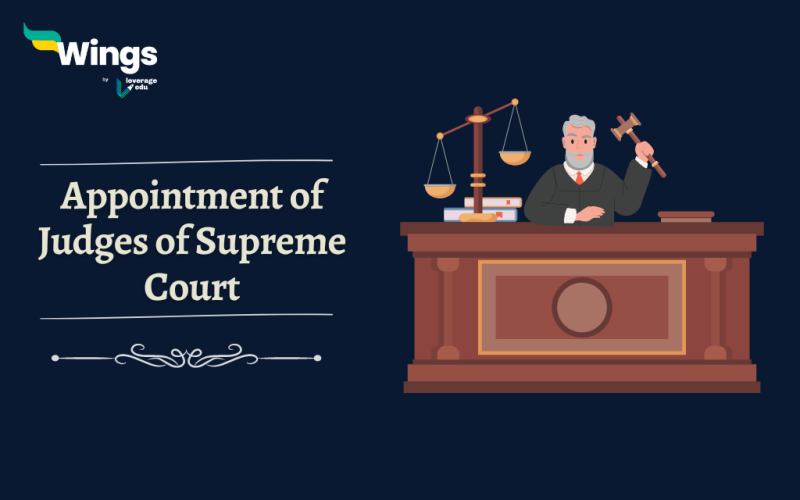The Appointment of Judges of Supreme Court of India is one of the most important aspects as the Judiciary is an integral part of the Indian Constitution. Some decisions and judgements have a huge impact on the people of the nation. For example, the recent Indian Agriculture Acts 2020 that the Supreme Court had the authority to put a stay on. Moreover, the Indian Constitution gives the right powers to the Judiciary. Hence, the appointment of judges of Supreme Court means that they uphold the Constitution to the highest level.
Table of Contents
Also Read: How many Supreme Court are there in India?
What is the Composition of Judges of the Supreme Court of India?
The Supreme Court is the apex of the Judicial system. Initially, the provision was for 7 judges and the Chief Justice. However, over the years the need for the increase in composition has played a part in the increase of Judges of the Supreme Court.
- Now, there needs to be 33 Judges and the Chief Justice of India.
- Thus, there are 34 Judges of the Supreme Court of India.
Also Read: Article 144 of Indian Constitution: Provisions, History
Wat is the Supreme Court Judge Eligibility Criteria?
When a Judge’s position in the Supreme Court of India is anticipated to become vacant. The Chief Justice of India will begin the process and send recommendations to the Union Minister of Law, Justice, and Company Affairs to fill the upcoming vacancy.
What are the Qualifications for the Appointment of a Supreme Court Judge?
Article 124 (3) of the Indian Constitution mentions the qualifications for the Appointment of a Judge:
- They must be a citizen of India.
- A candidate must have served as a High Court judge for at least 5 years or in two or more High Courts consecutively, OR
- They must have been an advocate of a High Court for at least 10 years, or of two or more High Courts in succession, OR
- They must be a “distinguished jurist” according to the President of India.
Appointment of the Judge by the President of India
Under Article 124, Clause 2 of the Indian Constitution, a Judge of the Supreme Court of India is appointed by the President of India.
- Initially, the appointment was made on the recommendation of the National Judicial Appointments Commission as per Article 124A.
- But the Supreme Court struck the Article off as per the Constitution (99th Amendment) Act of 2014.
- The case was between the Union of India vs the Supreme Court Advocates-on-Record Association and another.
Also Read: How is the President of India Elected?
What is the Tenure of Supreme Court Judge of India?
Once the appointment of the judge of Supreme Court is complete. The appointed judge can remain a judge in the apex court till the age of 65 or:
- Before they reach the age of 65, they can give their resignation to the President of India.
- The Judge can be removed from office under certain circumstances.
To be noted: There is no age limit for the appointment of judges of the Supreme Court.
What is the Supreme Court Judge Removal Process?
Under Clause 4 of Article 124, the Judge of the Supreme Court can be removed from office only on the grounds of incapacity or proven misbehaviour.
- Additionally, a Judge of the Supreme Court can only be removed from office by an order of the President of India.
- The removal process requires an address by each House of Parliament.
- This address must be supported by a majority of the total membership of the House.
- Moreover, it must be supported by a majority of not less than two-thirds of the members of the House present and voting.
What is the Collegium for Appointment of Supreme Court Judges?
A Collegium is a group of people who possess equal authority and power. The Collegium system has never been mentioned in the Indian Constitution but has somehow come into being through judicial interpretation.
- For the Appointment of Supreme Court Judges, the Collegium system comes into play.
- The Collegium consists of 4 most senior Judges of the Supreme Court of India and the Chief Justice of India.
- In addition, they play a part in the appointment, transfer and elevation of judges.
FAQs
Once there is a vacancy or there is going to be a vacancy among the 33 judges, the Chief Justice of India at the behest of the Union Ministry begins the entire process for the appointment of judge/s.
There is a Collegium system that is not mentioned in the Constitution but is a process that has come into being through judicial interpretation. The collegium decides upon the judge and the President of India appoints them.
The salary of a supreme court judge is decided by the Parliament and the salary is charged upon the Consolidated Fund of India.
Lastly, we hope you liked our blog and gained an understanding of the Appointment of Judges of Supreme Court. Moreover, you may even read more blogs and empower yourself with knowledge regarding Civics and Polity!
 One app for all your study abroad needs
One app for all your study abroad needs













